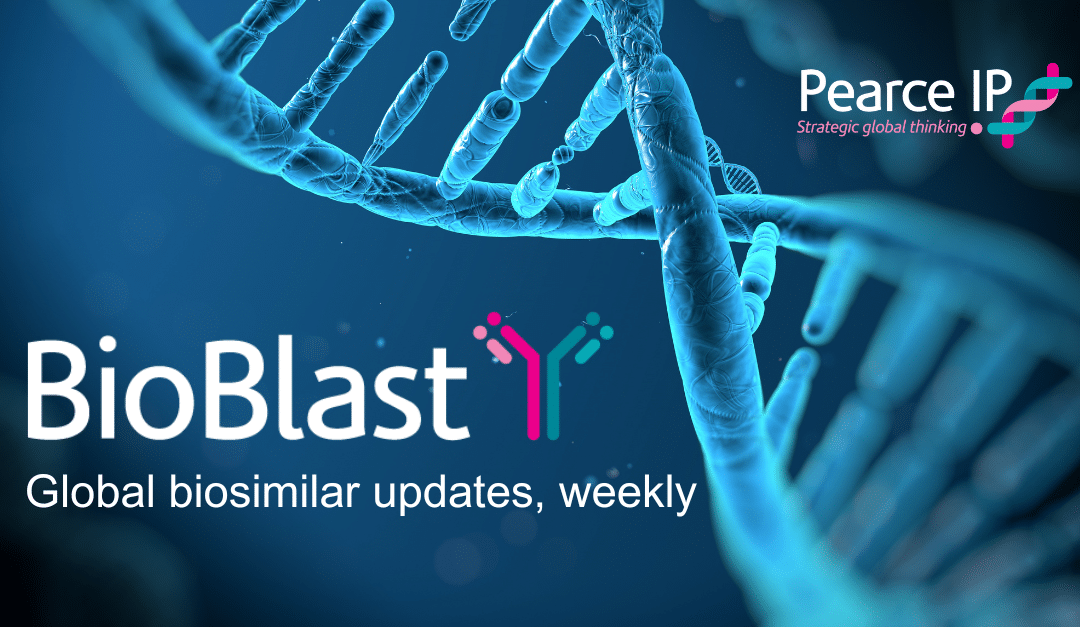28 April 2023 | US | FDA advisory committee supports approval of Merck’s Lynparza® (olaparib) combination for first line treatment of prostate cancer
Merck announced that the FDA’s Oncologic Drugs Advisory Committee (ODAC) has voted to support FDA approval of Lynparza® (olaparib) plus abiraterone and prednisone or prednisolone for the first-line treatment of BRCA-mutated metastatic castration-resistant prostate cancer (mCRPC). ODAC voted against approval for the combination beyond this patient population.
Lynparza® is currently approved in the US for patients with homologous recombination repair gene-mutated mCRPC who have progressed following prior treatment with enzalutamide or abiraterone. It is also approved for the treatment of ovarian, breast and pancreatic cancer. The first line combination use is approved in Europe for mCRPC patients in whom chemotherapy is not clinically indicated.
26 April 2023 | EU | New EU pharmaceutical reforms will impact biosimilars
The European Commission (EC) has adopted a proposal for a new Directive and a new Regulation which will revise and replace the existing pharmaceutical legislation, and amount to the largest regulatory reform in the EU in over 20 years. The Directive and Regulation have been submitted to the European Parliament and the Council of the EU for discussion. The EC confirmed that discussions will start as soon as possible, however it cannot predict the timing for adoption. Both the Parliament and Council will need to approve the reforms.
The regulatory reforms aim at increasing patient access to affordable medicines and improving the security of supply. EC Vice-President Margaritis Schinas has described the changes as “enormous”.
Key measures include:
- A 2 year reduction of the baseline data protection period in order to encourage early market access of generics and biosimilars. However, additional periods of data protection may be available when certain conditions, potentially extending the period of regulatory protection beyond those currently available.
- Companies marketing innovative medicines will have a minimum period of regulatory protection of 8 years, which includes 6 years of data protection and 2 years of market protection. However companies may benefit from additional periods of protection (total period up to 12 years, compared 11 years today). These additional periods of protection can be obtained if the medicine is launched in all Member States (+2 years), if the medicine addresses an unmet medical need (+6 months), or if comparative clinical trials are conducted (+6 months). A further year of data protection can be granted if the medicine can treat other disease(s) too. The 2 year protection based on launch in all Member States is expected to increase access by 15%.
- For rare disease medicines the standard market exclusivity will be set at 9 years. Companies may benefit from additional periods of market exclusivity if they launch in all Member States (+ 1 year), address a high unmet medical need (+1 year), or develop new therapeutic indications for an already authorised orphan medicine (up to 2 extra years). The total regulatory production periods can add to 13 years (today the maximum is 10 years).
- Broader scope of the ‘Bolar exemption’: biosimilars will not need risk management plans as the originator will already have one.
- An incentive for repurposing
- Faster authorisation of new medicines:
- The EMA will have 180 days instead of 210 to assess new medicines
- If medicines are of major public health interest, the EMA will only take 150 days
- The EC will have 46 days instead of 67 for authorisation
- Regulatory ‘sandboxes’ to test new regulatory approaches for novel therapies under real world conditions.
- The ability for governments to suspend data and market protection when a compulsory licence has been issued to tackle a public health emergency.
26 April 2023 | EU | CHMP recommends approval of Roche’s Columvi® (glofitamab) for R/R DLBCL
Roche announced that the EU’s European Medicines Agency’s Committee for Medicinal Products for Human Use (CHMP) has recommended the approval of Columvi® (glofitamab) for the treatment of adults with relapsed or refractory (R/R) diffuse large B-cell lymphoma (DLBCL) as a third line therapy. The recommendation was based on results from a phase I/II study, in which Columvi® was demonstrated to induce early and long-lasting responses in people with R/R DLBCL.
This news comes less than two weeks since the FDA approved Genentech/Roche’s Polivy® (polatuzumab vedotin-piiq) in combination with Rituxan® (rituximab) for DLBCL.
26 April 2023 | EU | CHMP recommends approval of Novartis’ Cosentyx® (secukinumab) for moderate to severe hidradenitis suppurativa
Novartis announced that the European Medicines Agency’s Committee for Medicinal Products for Human Use (CHMP) has recommended the grant of marketing authorization for Cosentyx® (secukinumab) in adults with active moderate to severe hidradenitis suppurativa, an inflammatory skin disease. The recommendation was based on results from two phase III trials which showed that patients who received Cosentyx® continued to improve beyond the primary endpoint analysis at week 16, with more than 55% of patients achieving a Hidradenitis Suppurativa Clinical Response at week 52.
Last year BioThera began phase III trials of BAT2306, biosimilar to Cosentyx®, in patients with moderate to severe plaque psoriasis.
25 April 2023 | Samsung Bioepis releases new data on aflibercept (Eylea®) biosimilar
Samsung Bioepis announced 1-year outcomes of its Ph III study of SB15 (biosimilar to Eylea® aflibercept) at the 2023 Association for Research in Vision and Ophthalmology (ARVO) Annual Meeting. Samsung Bioepis reported that the safety, immunogenicity and PK profiles of SB15 were comparable with those of aflibercept, and that no treatment-induced or treatment-boosted anti-drug antibodies developed in the switching group after week 32.
25 April 2023 | UK | STADA and Xbrane announce NHS supply of Ximluci® (ranibizumab), a biosimilar to Roche/Genentech’s Lucentis®
STADA and Xbrane announced they are supplying Ximluci® (a biosimilar to Roche/Genentech’s Lucentis® (ranibizumab)) in England under a NHS England Framework Agreement. Ximluci® is indicated for the treatment of retinal vascular disorders, including wet age-related macular degeneration, diabetic macular oedema, diabetic retinopathy, retinal vein occlusion and visual impairment due to choroidal neovascularization. STADA is responsible for commercializing Ximluci® across Europe and Xbrane is responsible for commercial supply.
On 3 April 2023 Stada and Xbrane announced the continental European launch of Ximluci®.
25 April 2023 | Formycon announces end of Phase I clinical study for Stelara® (ustekinemab) biosimilar
Formycon AG announced the successful conclusion of its extended Phase I clinical study comparing the pharmacokinetics of FYB202 and the reference drug Stelara® (ustekinumab). This follows Formycon’s report in August 2022 that its Phase III studies demonstrated the comparable efficacy of FYB202 and Stelara® in patients with moderate-to-severe psoriasis vulgaris (plaque psoriasis). Formycon stated FYB202 was bioequivalent to the reference drug Stelara® sourced in the EU as well as in the U.S. for all primary endpoint parameters.
EU and US regulatory submissions are still planned for the third quarter of 2023. The product will be sold by Fresenius Kabi in key global markets.
25 April 2023 | EU | Celltrion applies for EMA marketing authorisation of its biosimilar to Genentech/Novartis’ Xolair® (omalizumab)
Korea BioMed reported that Celltrion has submitted its application in EMA for CT-P39 (omalizumab), a biosimilar to Genentech/Novartis’ Xolair®. The reference product Xolair® is approved in Europe for the treatment of asthma, chronic spontaneous urticaria and severe chronic rhinosinusitis with nasal polyps, and in other markets. On 10 April 2023, Celltrion announced its phase III safety and efficacy results for CT-P39.
24 April 2023 | US | Xbrane resubmits BLA to the FDA for its investigational biosimilar to Genentech’s Lucentis® (ranibizumab)
Xbrane has announced it has resubmitted its BLA for its investigational biosimilar to Genentech’s Lucentis® (ranibizumab) with FDA. Xbrane expects that there will be a ten-month review process and its candidate could be approved during the first half of 2024. In July 2022, Xbrane received a General Advice letter from the FDA with comments and recommendations for the resubmission of its BLA for a ranibizumab biosimilar.

Naomi Pearce
CEO, Executive Lawyer (AU, NZ), Patent Attorney (AU, NZ) & Trade Mark Attorney (AU)
Naomi is the founder of Pearce IP, and is one of Australia’s leading IP practitioners. Naomi is a market leading, strategic, commercially astute, patent lawyer, patent attorney and trade mark attorney, with over 25 years’ experience, and a background in molecular biology/biochemistry. Ranked in virtually every notable legal directory, highly regarded by peers and clients, with a background in molecular biology, Naomi is renown for her successful and elegant IP/legal strategies.
Among other awards, Naomi is ranked in Chambers, IAM Patent 1000, IAM Strategy 300, is a MIP “Patent Star”, and is recognised as a WIPR Leader for patents and trade marks. Naomi is the 2023 Lawyers Weekly “IP Partner of the Year”, the 2022 Lexology client choice award recipient for Life Sciences, the 2022 Asia Pacific Women in Business Law “Patent Lawyer of the Year” and the 2021 Lawyers Weekly Women in Law SME “Partner of the Year”. Naomi is the founder of Pearce IP, which commenced in 2017 and won 2021 “IP Team of the Year” at the Australian Law Awards.

Sian Hope
Associate Lawyer
Sian is a driven intellectual property associate with a background in molecular genetics and experience in both private practice and within State Government. Sian’s experience working in medical research and advanced therapeutics policy supports Pearce IP’s clients on policy issues relating to the regulation of pharmaceutical/biopharmaceutical products in Australia.

